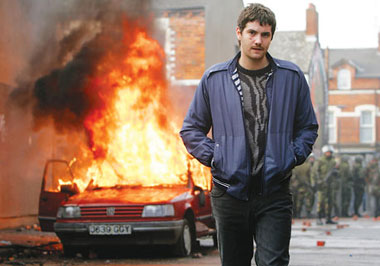
| HOME |
| NERVE |
| REVIEWS |
| ARCHIVE |
| EVENTS |
| LINKS |
| ABOUT US |
| CONTRIBUTORS |
| BACK ISSUES |
| CONTACT US |
 Fifty
Dead Men Walking (15)
Fifty
Dead Men Walking (15)
Directed by Kari Skogland
Written by Martin McGartland and Nicholas Davies (book), Kari Skogland
(screenplay)
Screening at FACT from 10th April 2009
Reviewed by Colin Serjent
In attempting an adaption of IRA informer Martin McGartland, producer/director Kari Skogland fails to truly convey the real essence of what occurred when the former wide boy and petty criminal agreed to feed data to the British Special Branch about the movements and activities of members of the Provos, for the sake of money.
Why make fiction of what took place during the Troubles when the truth itself is high drama?
The film basically ends up as a formula-based gangster movie, with too much emphasis on the domestic life of McGartland (played by Jim Sturgess) - constant squabbles with his partner Lara (Natalie Press), etc - and highly unlikely sequences. For example, McGarltand jumps from a thrid floor window to escape being tortured by the IRA - which was true - and ends up being picked up from the ground by his Special Branch handler Fergus (Ben Kingsley) - who just happened to be passing by. He is carted into an ambulance, which was conveniently in the vicinity at that time, and then rushed to hospital puusued by gun toting Provos in cars.
Another fabrication - perhaps even more absurd - occurs when, after being unmasked and sent into exile by the Brits, he is shot repeatedly by an IRA gunman but somehow survives again. This is fact but in the film this takes place in Canada - where Skogland hails from - when in truth it took place in Whitley Bay!
The title refers to the number of people - soldiers, RUC officers and civilians - he apparently helped save from being murdered by the IRA. On the other hand, how many IRA volunteers and civilian Catholics did he condemn to death by the occupying forces through his traitorous deeds?
In the closing credits of the film - which include the listing of landmark periods in the political process in Northern Ireland in the past twenty years or so - there is no reference to the momentous Good Friday Agreement, signed in Belfast in April 1998 by the British and Irish goverments and most Northern Irish political parties, including Sein Fein. The omission of this groundbreaking step sums up the facile nature of this heavily flawed film.